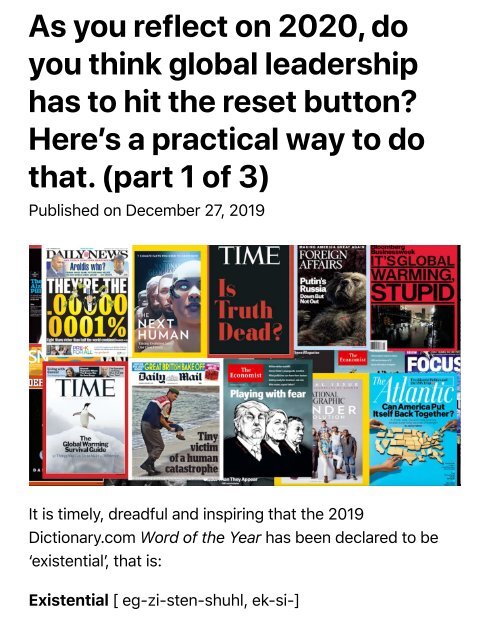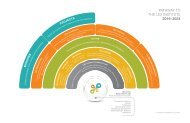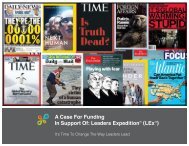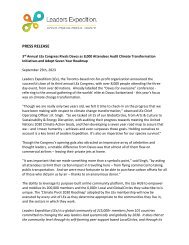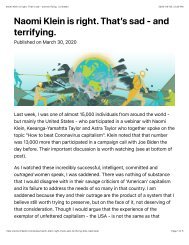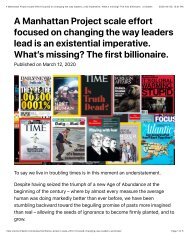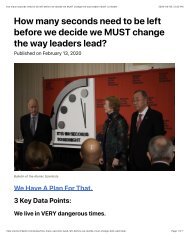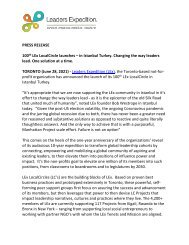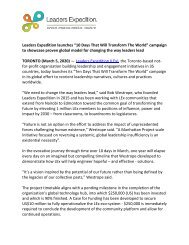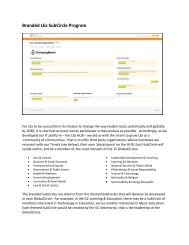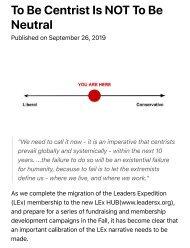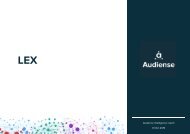Time to hit the leadership reset button_1
LinkedIn Article - published late December 2019. First of three in a series.
LinkedIn Article - published late December 2019. First of three in a series.
Create successful ePaper yourself
Turn your PDF publications into a flip-book with our unique Google optimized e-Paper software.
As you reflect on 2020, do<br />
you think global <strong>leadership</strong><br />
has <strong>to</strong> <strong>hit</strong> <strong>the</strong> <strong>reset</strong> but<strong>to</strong>n?<br />
Here’s a practical way <strong>to</strong> do<br />
that. (part 1 of 3)<br />
Published on December 27, 2019<br />
It is timely, dreadful and inspiring that <strong>the</strong> 2019<br />
Dictionary.com Word of <strong>the</strong> Year has been declared <strong>to</strong> be<br />
‘existential’, that is:<br />
Existential [ eg-zi-sten-shuhl, ek-si-]
adjective<br />
1. of or relating <strong>to</strong> existence: eg: Does climate change<br />
pose an existential threat <strong>to</strong> humanity?<br />
2. of, relating <strong>to</strong>, or characteristic of philosophical<br />
existentialism; concerned with <strong>the</strong> nature of human<br />
existence as determined by <strong>the</strong> individual's freely made<br />
choices.<br />
Something snapped in 2019. Maybe it was <strong>the</strong> warning of<br />
11,000 climate scientists of “un<strong>to</strong>ld suffering” if humanity<br />
does not immediately address what is now known as <strong>the</strong><br />
climate emergency. Or maybe it was <strong>the</strong> Yellow Vest and<br />
pro-democracy protests in France and Hong Kong<br />
respectively, <strong>the</strong> odd and awkward creep of Brexit, <strong>the</strong> Nazi<br />
‘emergency’ declared in Dresden or <strong>the</strong> 5,427 ‘false or<br />
misleading’ claims made by <strong>the</strong> US commander-in-chief in<br />
<strong>the</strong> first 282 days of this year alone. Of course, in truth it<br />
was all of those and much, much, much more - <strong>the</strong> deluge<br />
of news we each process each day.<br />
More so than has been true for a very long time,<br />
thoughtful observers of <strong>the</strong> human future across many<br />
fields and geographies have begun <strong>to</strong> earnestly wonder<br />
– is <strong>the</strong>re a future - or more helpfully, a future for <strong>the</strong><br />
civil society of liberal democracies? It seems that more<br />
and more issues are being recognized as existential in<br />
nature, that is clearly ‘of or relating <strong>to</strong> existence’- making
<strong>the</strong> management of all of <strong>the</strong>m all <strong>to</strong>ge<strong>the</strong>r mindnumbingly<br />
daunting.<br />
Little wonder <strong>the</strong>n that <strong>the</strong> words that were amongst those<br />
most searched on Dictionary.com in 2019 ranged from polar<br />
vortex <strong>to</strong> s<strong>to</strong>chastic terrorism <strong>to</strong> exonerate – and that<br />
word, existential.<br />
It was in this context that Peter Biro and Howard Aster<br />
convened 25 subject matter experts from around <strong>the</strong> world<br />
<strong>to</strong> consider <strong>the</strong> <strong>to</strong>pic Constitutional Democracy Under<br />
Stress: The Need for Heroic Citizenship, over <strong>the</strong> course of<br />
a powerful two-day conference at Ryerson University’s Ted<br />
Rogers School of Management in Toron<strong>to</strong> Canada in<br />
Oc<strong>to</strong>ber of this year.<br />
The somber, very serious <strong>to</strong>ne of <strong>the</strong> proceedings - and of<br />
<strong>the</strong> paper-givers generally - was well caught by conference<br />
Co-Host Peter Biro;<br />
“It is not catastrophizing <strong>to</strong>o much <strong>to</strong> declare that a dark<br />
age is upon us. Notwithstanding <strong>the</strong> recent optimistic<br />
outlook of some observers of <strong>the</strong> human condition and,<br />
indeed, of <strong>the</strong> state of liberal democracy in <strong>the</strong> world, I<br />
submit that we are witnessing, on a grand scale, an<br />
unmistakable retreat from <strong>the</strong> allegiance <strong>to</strong> <strong>the</strong> liberal<br />
democratic principles throughout <strong>the</strong> west.”[1]
Indeed, on subjects ranging from populism, freedom of<br />
speech, climate change, youth mobilization, elec<strong>to</strong>ral<br />
reform, <strong>the</strong> role of big data, human rights, diversity <strong>to</strong> art<br />
and art education <strong>to</strong> name just some, <strong>the</strong> paper givers each<br />
described a complex reality that each demanded at<br />
minimum a complex and uncertain response. It was not just<br />
<strong>the</strong> immensity of addressing <strong>the</strong>ir subject at hand, but more<br />
so <strong>the</strong> increasingly evident challenge of doing so each at<br />
<strong>the</strong> same time simultaneously, and with in fact, shockingly<br />
little time <strong>to</strong> do it.<br />
But <strong>the</strong>re was also <strong>to</strong>o <strong>the</strong> inspiration of those “concerned<br />
with <strong>the</strong> nature of human existence as determined by <strong>the</strong><br />
individual's freely made choices”. These were <strong>the</strong> hundreds<br />
of participants – presenters and audience alike – giving so<br />
generously of <strong>the</strong>ir time and expertise <strong>to</strong> address <strong>the</strong>se<br />
vital, pressing issues. And <strong>the</strong>re was <strong>the</strong> inspiration of <strong>the</strong><br />
s<strong>to</strong>ries that were <strong>to</strong>ld and shared, that showed <strong>the</strong> power of<br />
purposeful individual and in <strong>the</strong> aggregate collective action<br />
– of <strong>the</strong> capacity of free choice <strong>to</strong> change <strong>the</strong> world. Such<br />
exemplars were <strong>the</strong> heroic citizens sought by <strong>the</strong><br />
conference organizers <strong>to</strong> ‘redeem’ liberal democracy.<br />
However, it was a fact <strong>to</strong>o that like so many existential<br />
conversations every day, every where, <strong>the</strong> question left<br />
hanging at <strong>the</strong> end of each session was ‘what can I as an<br />
individual do <strong>to</strong> make a difference, and how do I go about
doing so?” To contemplate action in <strong>the</strong> face of so much<br />
magnitude and ambiguity is almost overwhelming.<br />
As it happens, at <strong>the</strong> periphery of <strong>the</strong> conference – as a<br />
sponsor – was a purpose-built potential answer <strong>to</strong> that<br />
question, perhaps even <strong>the</strong> scaffolding for <strong>the</strong> apparatus<br />
that has <strong>the</strong> potential <strong>to</strong> redeem liberal democracy and<br />
successfully address <strong>the</strong> existential issues that need<br />
addressing in our lifetime. It is called Leaders Expedition<br />
(LEx), and I am its founder and Executive Direc<strong>to</strong>r.<br />
In <strong>the</strong> spring of 2016, a diverse group of 25 people came<br />
<strong>to</strong>ge<strong>the</strong>r from across North America <strong>to</strong> ratify <strong>the</strong> tenets of<br />
an organization that would come <strong>to</strong> be known as Leaders<br />
Expedition. We were also <strong>the</strong>re <strong>to</strong> consider two defining<br />
challenges:<br />
i) what was <strong>the</strong> greatest inhibi<strong>to</strong>r <strong>to</strong> humanity being<br />
able <strong>to</strong> address <strong>the</strong> existential issues that needed<br />
addressing, while assuring its full potential in an age of<br />
abundance? And,<br />
ii)<br />
what was <strong>the</strong> solution?<br />
Since <strong>the</strong>n, over 650+ members from 35+ countries, have<br />
invested over 15,000 hours in designing and pro<strong>to</strong>typing <strong>the</strong><br />
solution <strong>to</strong> <strong>the</strong>se two challenges. With respect <strong>to</strong> <strong>the</strong> first,<br />
we believe that <strong>the</strong>re is an existential
<strong>leadership</strong> insufficiency that is systemic and global, and that<br />
a new cohort of existing and aspiring leaders need <strong>to</strong><br />
be connected, empowered, mobilized and elevated <strong>to</strong><br />
positions of influence, power and impact, from classrooms<br />
<strong>to</strong> board rooms <strong>to</strong> legislatures – <strong>to</strong> thus <strong>the</strong>n author <strong>the</strong><br />
solutions that will transform <strong>the</strong> world.<br />
With respect <strong>to</strong> <strong>the</strong> second challenge, we believe that<br />
<strong>the</strong> gordian knot-like complexity of <strong>the</strong> noted systemic<br />
and global <strong>leadership</strong> insufficiency demands nothing<br />
less than a Manhattan Project-like response that must<br />
be materially underway by 2030 <strong>to</strong> assure <strong>the</strong> survival of<br />
civil society. Moreover, only a nuanced eco-system of<br />
solutions has any prospect at all of being able <strong>to</strong> impact<br />
<strong>leadership</strong> narratives, cultures and practices in just ten<br />
years – that is what we have invested our time<br />
designing, pro<strong>to</strong>typing and deploying.<br />
The Context for LEx<br />
We live in an Age of Abundance. Since <strong>the</strong> Industrial<br />
Revolution <strong>the</strong>re have been exponential advances in science<br />
and technology that are now accelerating at a pace that is<br />
all but incomprehensible.<br />
These gains mean that in <strong>the</strong> last 10-20 years we have<br />
crossed from one his<strong>to</strong>ric period <strong>to</strong> ano<strong>the</strong>r – from <strong>the</strong> Age<br />
of Scarcity that defined <strong>the</strong> human experience since <strong>the</strong>
dawn of time, <strong>to</strong> this new Age of Abundance.<br />
Where it was <strong>the</strong> case that <strong>the</strong>re was <strong>to</strong>o little food, not<br />
enough doc<strong>to</strong>rs or teachers, not enough resource or<br />
infrastructure, not enough money – that is simply no longer<br />
true. Where all of <strong>the</strong> economic orders – Mercantilism,<br />
Communism, Capitalism – existed <strong>to</strong> ration scarce resources<br />
in a world <strong>to</strong>o large – <strong>to</strong>day we can feed everyone, house<br />
everyone, educate everyone and provide healthcare <strong>to</strong><br />
everyone.<br />
In fact, thought leaders such as Steven Pinker tell us that<br />
<strong>the</strong>re has never been a better time <strong>to</strong> be a human – <strong>to</strong> be<br />
alive. By any measure – diet, education, mortality, income –<br />
more humans are leading materially better lives than even<br />
was <strong>the</strong> case 20 years ago.<br />
For <strong>the</strong> first time in human his<strong>to</strong>ry we have <strong>the</strong> means <strong>to</strong><br />
assure that we can all live a full life lived with dignity, and <strong>to</strong><br />
<strong>the</strong> extent that we cannot <strong>to</strong>day, we know that within <strong>the</strong><br />
very, very near future those exponential advances in science<br />
and technology will assure that we can.<br />
And this is just <strong>the</strong> dawn of this new age.<br />
But, <strong>the</strong>re is a but. Those same exponential advances in<br />
science and technology are also driving – directly and<br />
consequentially – <strong>the</strong> advent of profound environmental,
socio-political, cultural and economic stresses, from <strong>the</strong><br />
climate emergency, <strong>to</strong> nuclear proliferation, <strong>to</strong> healthcare,<br />
education, law and social justice issues and income<br />
Inequality <strong>to</strong> name just a few.<br />
Humanity is approaching a pivot point – a convergence<br />
of many existential issues – where failure <strong>to</strong> successfully<br />
address any one of <strong>the</strong>m is simply inconceivable. The<br />
societal turbulence resulting from <strong>the</strong>se advances are, or<br />
will soon be, amplified by profound disruptions <strong>to</strong> <strong>the</strong> labour<br />
markets caused by AI/robotics and in health care – both in<br />
<strong>the</strong>ir own way challenging sooner than we can comprehend<br />
what it means <strong>to</strong> be a human. Our own eyes, and <strong>the</strong><br />
warnings of many organizations – most notably <strong>the</strong> United<br />
Nations tells us that we don’t have much time.<br />
It is increasingly clear that <strong>the</strong> world we live in <strong>to</strong>day is being<br />
defined by a desperate competition between those that<br />
believe in <strong>the</strong> infinite possibilities of our future and <strong>the</strong> glory<br />
of human potential, versus those who instead seek comfort<br />
and security in <strong>the</strong> things <strong>the</strong>y believe <strong>to</strong> be true from <strong>the</strong>ir<br />
perceived past. For all of <strong>the</strong>ir contempt for each o<strong>the</strong>r, <strong>the</strong><br />
radicalized ISIS recruit and <strong>the</strong> radicalized w<strong>hit</strong>e nationalist<br />
have a great deal in common – <strong>the</strong> future as an unknown is<br />
<strong>to</strong> be feared and avoided, whereas <strong>the</strong> seduction of a highly<br />
curated but known past is <strong>to</strong> be embraced.<br />
Though <strong>the</strong> latter is <strong>the</strong> smaller cohort in numbers in almost
every democracy (however defined), we are seeing <strong>the</strong>se<br />
numbers grow as we collectively perceive that we are just<br />
on <strong>the</strong> knee curve of increasing societal volatility. The postmodernist<br />
questioning of <strong>the</strong> truth that emanated from leftwing<br />
intellectuals in <strong>the</strong> 60’s has been adopted instead by<br />
those cynically manipulating social discourse <strong>to</strong> exacerbate<br />
division in a way that is anything but intellectual. At all<br />
levels, <strong>the</strong> technologies that seek <strong>to</strong> enrich and simplify our<br />
lives, paradoxically and bewilderingly make <strong>the</strong>m vastly<br />
more complex. The consequence of 280-character mass<br />
communication shows this <strong>to</strong> be so.<br />
While it is tempting <strong>to</strong> point <strong>to</strong> iconic individuals in <strong>the</strong><br />
moment as causal agents of <strong>the</strong> cancer of populism, we<br />
have <strong>to</strong> (more helpfully) admit that <strong>the</strong>y are in fact ‘just’<br />
metastasized examples of <strong>the</strong> same disease. And, just as a<br />
life-threatening illness can cause depression in an<br />
individual, it seems clear that way-of-life societal challenges<br />
– real and perceived – are doing <strong>the</strong> same. As this malaise<br />
deepens <strong>to</strong> a generalized ennui amongst <strong>to</strong>o many, we see<br />
<strong>the</strong> question raised ‘what can I as an individual do?’ not as a<br />
question, but ra<strong>the</strong>r a declaration that <strong>the</strong>y intend <strong>to</strong> do<br />
nothing at all.<br />
But it is <strong>the</strong> social credit experiment of <strong>the</strong> People’s<br />
Republic of China that perhaps best illustrates <strong>the</strong> potential<br />
<strong>to</strong> retard or reverse <strong>the</strong> development of civil society – <strong>to</strong> not
inconceivably ‘dead-end’ humanity.<br />
First announced in 2014, <strong>the</strong> objective of <strong>the</strong> program is <strong>to</strong><br />
cement <strong>the</strong> belief that “keeping trust is glorious and<br />
breaking trust is disgraceful”, where ‘good’ behaviour (as<br />
defined by <strong>the</strong> state) is rewarded and ‘bad’ behaviour<br />
punished, by a co-opted and corrupted society. In just a<br />
few days, that is 2020, <strong>the</strong> compulsory program will require<br />
that each new cell phone purchase will require <strong>the</strong><br />
manda<strong>to</strong>ry registration of <strong>the</strong> owners face, and <strong>the</strong><br />
subsequent ga<strong>the</strong>ring and processing of state and nonstate<br />
data sources on <strong>the</strong>m - from <strong>the</strong>ir primary school<br />
marks <strong>to</strong> <strong>the</strong>ir real-time social media activity - <strong>to</strong> establish<br />
that individual’s unique social credit score.<br />
This is not some <strong>the</strong>oretical Orwellian future. This system<br />
exists <strong>to</strong>day, rendering <strong>the</strong> Uighur people as <strong>the</strong> first<br />
digitally imprisoned population in his<strong>to</strong>ry. It is increasingly<br />
<strong>the</strong> exemplar for many around <strong>the</strong> world that see it as <strong>the</strong><br />
foundation for not only au<strong>to</strong>cratic governance, but of<br />
‘illiberal’ democracies as defined by Hungary’s Vik<strong>to</strong>r<br />
Orban. Moreover, in <strong>the</strong> techno-driven disruption of <strong>the</strong><br />
near future, it is possible <strong>to</strong> imagine liberal democracies<br />
accepting similar controls if stressed by extreme economic<br />
distress or civil unrest.<br />
For <strong>the</strong> first time in human his<strong>to</strong>ry – in our near future - we<br />
can contemplate a state where organized opposition is
simply no longer feasible (witness <strong>the</strong> Uighurs). In such a<br />
‘dead-end’ state it is impossible <strong>to</strong> imagine that <strong>the</strong> pressing<br />
existential issues of our day can and will be addressed in a<br />
manner that secures <strong>the</strong> best possible future for humanity.<br />
Is <strong>the</strong> prospect of a dys<strong>to</strong>pian future certain? Certainly<br />
not. There is far more evidence in <strong>the</strong> wonder that is<br />
humanity <strong>to</strong> suggest that we will <strong>to</strong>ge<strong>the</strong>r find that best<br />
possible future. But still, <strong>the</strong> odds that our newly<br />
connected species will take a tragically errant step are<br />
uncomfortably high and getting higher. The possibility<br />
that that dys<strong>to</strong>pian future might be possible means that<br />
all exertions must be made <strong>to</strong> guarantee that it is not.<br />
We assume that <strong>the</strong> human species has 10 <strong>to</strong> 20 years <strong>to</strong><br />
organize <strong>the</strong> conduct of its nations, cultures, economies,<br />
religions, ideologies and people in such a way so as <strong>to</strong> be<br />
able <strong>to</strong> shape a positive future - all <strong>the</strong> while avoiding <strong>the</strong><br />
daily catastrophes that have always dogged our path.<br />
In a very short period of time we need<br />
<strong>to</strong> connect, empower and mobilize a global community of<br />
people who accept <strong>the</strong> possibility of both futures - and are<br />
united in <strong>the</strong>ir determination <strong>to</strong> transform community and<br />
sec<strong>to</strong>ral <strong>leadership</strong> so that we create <strong>the</strong> one marked by <strong>the</strong><br />
pursuit of wonder as opposed <strong>to</strong> one of squalid<br />
mediocrity. That is why Leaders Expedition (LEx) was<br />
founded with <strong>the</strong> moonshot objective of “elevating one
million members <strong>to</strong> positions of influence, power and impact<br />
by 2030: from <strong>the</strong> classroom <strong>to</strong> <strong>the</strong> boardroom <strong>to</strong> <strong>the</strong><br />
legislature”.<br />
In a world that is ever more tribal, we are creating a new<br />
tribe, one that is inescapably and unapologetically global<br />
– one that is defined by our Tenets. However, unlike<br />
o<strong>the</strong>r tribes that by definition seek first <strong>to</strong> insulate and<br />
distinguish <strong>the</strong>mselves from those around <strong>the</strong>m, we seek<br />
<strong>to</strong> engage with <strong>the</strong> people within those tribes who share<br />
our commitment <strong>to</strong> <strong>the</strong> future. From villages, <strong>to</strong>wns,<br />
cities and nations; from cultures, classes, religions and<br />
ideologies; <strong>to</strong> <strong>the</strong> grand sec<strong>to</strong>rs that are impacting us all,<br />
we must prevail in our pursuit of a positive future.<br />
This challenge would be audacious enough if we had a<br />
century <strong>to</strong> achieve our objective. But clearly, we don’t.<br />
Which begs <strong>the</strong> question, are we going <strong>to</strong> trust ONLY <strong>the</strong><br />
Darwinian marketplace of ideas <strong>to</strong> assure that enlightened<br />
humanity prevails by 2030? That is, that <strong>the</strong> millions of<br />
charities, nonprofit organizations, NGO’s, social enterprises,<br />
governments and o<strong>the</strong>r good ac<strong>to</strong>rs all acting in good<br />
faith will somehow independently and in concert, avoid <strong>the</strong><br />
dead-ending of humanity and our consequent ability <strong>to</strong><br />
appropriately address all of <strong>the</strong> noted existential issues by<br />
2030?<br />
Or do we bias for success humanity’s efforts by launching a
purposeful, systemic global effort by connecting,<br />
empowering and mobilizing <strong>the</strong> community that is powerful<br />
enough <strong>to</strong> transform <strong>the</strong> world – <strong>to</strong> change <strong>the</strong> way leaders<br />
lead by 2030. A Manhattan Project scale initiative<br />
targeting <strong>the</strong> root cause of all existential issues – <strong>leadership</strong><br />
– just as Bill Gates targeted <strong>the</strong> eradication of malaria and<br />
polio, and likewise predicated on <strong>the</strong> assumption that failure<br />
is not an option.<br />
That is Leaders Expedition (LEx).<br />
Look in <strong>the</strong> coming days for <strong>the</strong> second of three<br />
instalments, detailing <strong>the</strong> LEx value proposition, where we<br />
discuss <strong>the</strong> value system on which LEx is founded - our<br />
Vision, Mission, Charter and Core Values.<br />
Resources:<br />
LEx Website & Community<br />
[1] Peter Biro, “The Retreat of Liberal Constitutional<br />
Democracy and <strong>the</strong> Urgent Need for Heroic Citizenship”<br />
in Constitutional Democracy Under Stress: A <strong>Time</strong> for<br />
Heroic Citizenship, Mosaic Press, To be published Spring<br />
2020


